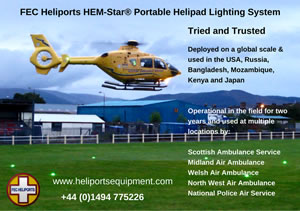ADi News2013-09-03 13:30:50
AgustaWestland AW609 TiltRotor Aerodynamic Improvements Set To Boost Performance
AgustaWestland, a Finmeccanica company, is flight testing a number of aerodynamic improvements that will boost the performance of the AW609 TiltRotor. On the 25th July 2013 AgustaWestland undertook the first flight of a modified vertical tail fin on AW609 TiltRotor prototype #2 at its Cascina Costa flight test facility in Italy. The modified vertical fin is one part of a extensive package of product improvements which also include a new, more aerodynamic, design for the engine exhaust nozzles and changes to the prop-rotor spinner cones. Together, these modifications reduce the drag factor of the AW609 TiltRotor by approximately ten percent, as well as delivering a significant weight reduction, with a resulting performance increase.
Clive Scott, AW609 Programme Manager, said "These aerodynamic improvements, new avionics, new cockpit display system and a large number of other improvements will together give the aircraft greater performance and mission capabilities, making it even more attractive for carrying out a wide range of missions which can benefit from its much higher cruise speed, high altitude cruise capability and longer range, when compared to existing helicopters or other proposed high speed rotorcraft."
An upgraded version of the Pratt & Whitney Canada PT6 engine is being used on the AW609 TiltRotor and will include the latest in technological developments, providing the aircraft with increased performance capabilities as well as the latest safety enhancements.
Rockwell Collins is supplying a fully integrated cockpit for the AW609 TiltRotor based on its Pro Line Fusion system, allowing AgustaWestland to adopt the very latest in commercial aircraft cockpit technologies, including 14 inch (35.5 cm) touch screen displays, integrated flight management systems with satellite based navigation, synthetic and enhanced vision systems and Head-Up-Display interfaces; all of which will be integrated with the aircraft's own avionics management systems. This cockpit suite will provide the crew with increased situational awareness and will reduce pilot workload.
BAE Systems is providing an upgraded Flight Control Computer at the heart of the AW609 TiltRotor's triple redundant fully digital fly-by-wire flight control system. The computer will include not only the AgustaWestland control laws and flight control software but also the digital engine control system.
These modifications are an integral part of the overall AW609 TiltRotor programme re-baselining aimed at reducing customer acquisition and operating costs, coupled with delivering performance and technology improvements.
The AgustaWestland US subsidiary, AgustaWestland Tilt-Rotor Company, based in Arlington, Texas, is the Type applicant for the AW609 TiltRotor supported by an Integrated Development Team, based both in Arlington and in Cascina Costa, Italy. The first prototype is continuing with envelope expansion activities in the US whilst the second prototype is flying from Cascina Costa, with nearly 800 flying hours completed on these aircraft . A further two prototypes are under final assembly in Italy.
AgustaWestland, a Finmeccanica company, is flight testing a number of aerodynamic improvements that will boost the performance of the AW609 TiltRotor. On the 25th July 2013 AgustaWestland undertook the first flight of a modified vertical tail fin on AW609 TiltRotor prototype #2 at its Cascina Costa flight test facility in Italy. The modified vertical fin is one part of a extensive package of product improvements which also include a new, more aerodynamic, design for the engine exhaust nozzles and changes to the prop-rotor spinner cones. Together, these modifications reduce the drag factor of the AW609 TiltRotor by approximately ten percent, as well as delivering a significant weight reduction, with a resulting performance increase.
Clive Scott, AW609 Programme Manager, said "These aerodynamic improvements, new avionics, new cockpit display system and a large number of other improvements will together give the aircraft greater performance and mission capabilities, making it even more attractive for carrying out a wide range of missions which can benefit from its much higher cruise speed, high altitude cruise capability and longer range, when compared to existing helicopters or other proposed high speed rotorcraft."
An upgraded version of the Pratt & Whitney Canada PT6 engine is being used on the AW609 TiltRotor and will include the latest in technological developments, providing the aircraft with increased performance capabilities as well as the latest safety enhancements.
Rockwell Collins is supplying a fully integrated cockpit for the AW609 TiltRotor based on its Pro Line Fusion system, allowing AgustaWestland to adopt the very latest in commercial aircraft cockpit technologies, including 14 inch (35.5 cm) touch screen displays, integrated flight management systems with satellite based navigation, synthetic and enhanced vision systems and Head-Up-Display interfaces; all of which will be integrated with the aircraft's own avionics management systems. This cockpit suite will provide the crew with increased situational awareness and will reduce pilot workload.
BAE Systems is providing an upgraded Flight Control Computer at the heart of the AW609 TiltRotor's triple redundant fully digital fly-by-wire flight control system. The computer will include not only the AgustaWestland control laws and flight control software but also the digital engine control system.
These modifications are an integral part of the overall AW609 TiltRotor programme re-baselining aimed at reducing customer acquisition and operating costs, coupled with delivering performance and technology improvements.
The AgustaWestland US subsidiary, AgustaWestland Tilt-Rotor Company, based in Arlington, Texas, is the Type applicant for the AW609 TiltRotor supported by an Integrated Development Team, based both in Arlington and in Cascina Costa, Italy. The first prototype is continuing with envelope expansion activities in the US whilst the second prototype is flying from Cascina Costa, with nearly 800 flying hours completed on these aircraft . A further two prototypes are under final assembly in Italy.
For more information contact:
